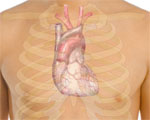Nanoparticles Could Reduce Heart Attack Damage
 Jan-22-14
Researchers have found a way to reduce heart swelling after a heart attack by using injectable nanoparticles, which could help increase the patient’s chance of survival.
Jan-22-14
Researchers have found a way to reduce heart swelling after a heart attack by using injectable nanoparticles, which could help increase the patient’s chance of survival.The process, developed by researchers at Northwestern University and the University of Sydney in Australia, involves injecting negatively charged nanoparticles made of a biocompatible and biodegradable polymer into the bloodstream within 24 hours after the heart attack has occurred. The particles attract the positively-charged monocytes—inflammatory cells that hurry to the oxygen-starved tissue—and redirect them to the spleen instead.
In tests on animals, the treatment resulted in a 50 percent reduction in the size of the heart lesion, allowing the heart to pump significantly more blood. The particles have already been approved by the FDA, and also show promise in treating many other inflammatory diseases.
More Info about this Invention:
[GIZMAG.COM][NORTHWESTERN UNIVERSITY]

Add Your Comment